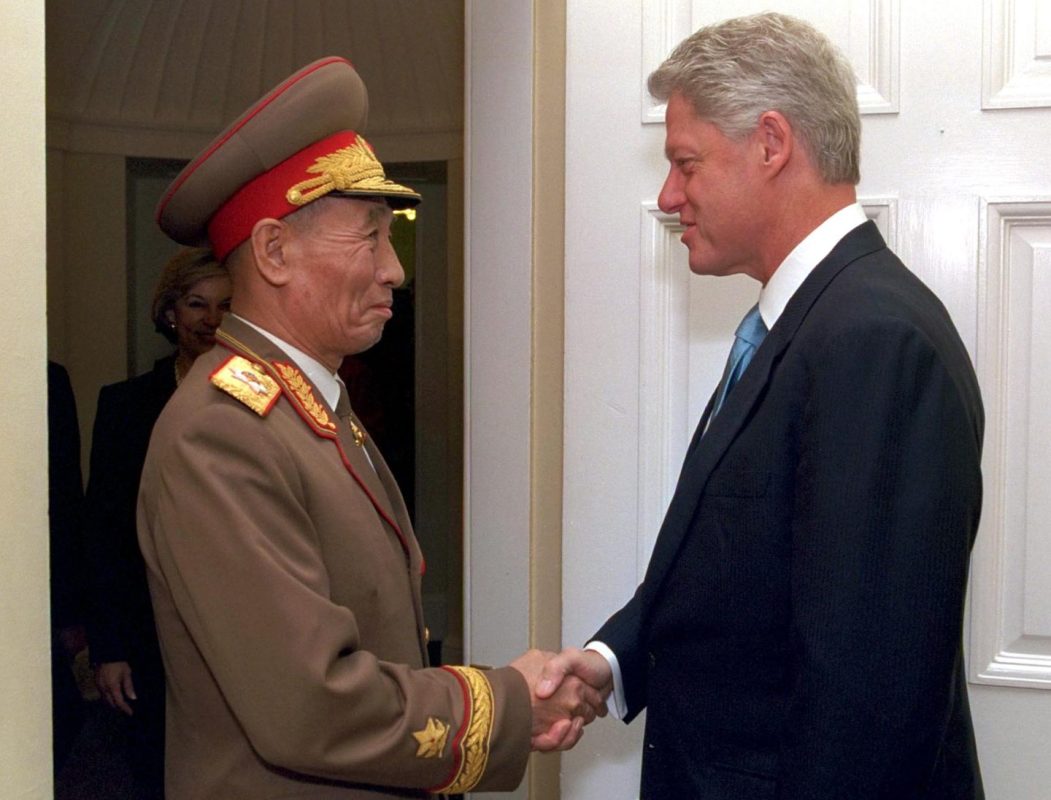With his expected visit to the U.S. this week, former military intelligence chief Kim Yong Chol would become the highest-level North Korean official to talk peace on U.S. soil in nearly 20 years. It’s potentially a landmark moment in U.S.-North Korean relations, but that fact should also serve as a warning from the not-so-distant past.
That previous high-profile visit, after all, left U.S. officials optimistic that they were “on the verge” of a historic deal, only to see their hopes dashed and their years of diplomatic maneuvering scuttled.
It was October 2000 and North Korean Vice-Marshal Jo Myong-Rok had made the 7,000-mile journey to Washington, D.C. for his country’s first-ever high-level diplomatic trip to the U.S. Everything had gone swimmingly, including a visit to high-tech firms in California before meetings in the nation’s capital with top U.S. officials up to then-President Bill Clinton.
Near the end of the trip, a D.C. banquet hall played host to an extraordinary diplomatic scene: Jo, at ease in the land of his longtime adversaries, complimented then-Secretary of State Madeleine Albright for his warm reception and “also for this sumptuous dinner tonight in this friendly atmosphere.”
Jo even got some laughs from the room when he joked about the “advanced age” of former Defense Secretary William Perry, the point man in the U.S.-North Korea negotiations and a statesman just three weeks Jo’s elder.
The quip was a small, personal moment amid what looked like an imminent, momentous diplomatic coup: a normalization of relations between the U.S. and North Korea.
“The dramatic and positive developments and changes taking place on the Korean Peninsula clearly indicates the possibility of such dramatic changes due to take place in the bilateral relations between the Democratic People’s Republic of Korea and the United States,” Jo told the banquet audience. He finished his brief remarks with a toast to the health of Albright and the other U.S. officials “at this important significant opportunity and place.”
Perry, who had been appointed by Clinton in 1998 to do an independent review of the U.S. government’s Korea policy, later said he felt the administration was “very, very close” to nailing down a “formal agreement” between Clinton and Kim Jong Il, the North Korean dictator and father of current leader Kim Jong Un.
“The warm feelings in the room that night, along with the developments of the previous year, made us all hopeful that the threat of a nuclear North Korea was behind us,” Perry later wrote. “But that was not to be.”
In his book and in a recent interview with The New York Times, Perry focused on two factors that he said pummeled the U.S.-North Korean relations from the banquet high to “Axis of Evil” lows.
First, Perry writes that with only three months left in office, President Clinton wanted a final, big foreign policy victory. He had two opportunities: North Korea and the Middle East.
“He held both in high priority, believed that he had a chance to achieve one, but did not have time for both,” Perry writes. “He chose to spend his remaining time on a Mideast peace treaty, and almost succeeded but ultimately fell short when Yasser Arafat developed cold feet at the last minute. So sadly then, despite a determined and creative effort, President Clinton lost on both issues.”
Second, Perry said that he considered Jo’s visit to Washington, D.C., a “big success, but it was a success that occurred, I might point out to you, in mid-October of 2000. And you know a funny thing happened two weeks after that, which is a U.S. election.”
When George W. Bush came into office in January 2001, Perry said he tried to keep the U.S. on the diplomatic track with North Korea, but the Bush administration took a much harder line, cutting off diplomatic contact, canceling further meetings and eventually, as mentioned, labeling North Korea part of an “Axis of Evil” with Iraq and Iran.
“In 2000, we had the possibility (not a certainty) of reaching some degree of normalization with a North Korea that appeared ready to give up its nuclear aspirations for economic revival,” Perry writes. “By 2015 we faced an angry and defiant North Korea that had armed itself with six to ten nuclear bombs, was producing fissile material for more bombs, and was testing the components of long-range missiles. Based on those outcomes, this is perhaps the most unsuccessful exercise of diplomacy in our country’s history.”
But now, more than 17 years after Jo’s trip and with another high-level North Korean official in the country, President Trump has another bite at the apple.
He has an advantage over Clinton as far as time. Trump has more than two years left in his term, at least, to pursue his own strategy on North Korea.
What Trump may need, however, is focus. In the grand calculus of geopolitical diplomacy, Clinton chose to focus his remaining time and resources on a single foreign policy gambit, knowing he wouldn’t be able to split his attention successfully between two.
Trump, who is known for jumping from topic to topic within the span of a sentence, would have to devote some considerable time to the talks with North Korea, especially since the State Department reportedly continues to bleed senior officials, including the current point man on North Korea talks.
And as he tweeted Tuesday morning, the president already has a lot on his plate, and he didn’t mention Syria or his own promises about Middle East peace:
This article was featured in the InsideHook newsletter. Sign up now.
























